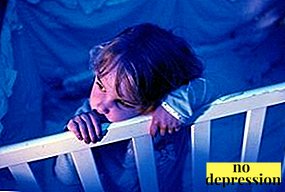Every parent wants his baby to sleep well and get enough sleep at night, because it is in a dream that an active growth and development of the organism takes place. But, unfortunately, all moms and dads at least once in their life had to deal with the problem of lack of sleep in a child and wondering "What if the child does not sleep at night?".
The child as a sponge absorbs all the information coming to him from the outside world, and in a dream it is processed, analyzed and assimilated. Sleep is an indicator of a child’s health. If he does not sleep well, then there are physical or psychological problems.
The content of the article:
Watching the behavior
Common causes
Psychologist's comment
 A child is a person from birth to the end of puberty, legally - to adulthood. For each age, its own norms, rules and time frames for night and daytime sleep, as well as the total sleep time are defined. So, if a newborn sleeps 16 hours a day, the total sleep time of a child of three years is already 12 hours, and a teenager will need only 8 hours of sleep at night.
A child is a person from birth to the end of puberty, legally - to adulthood. For each age, its own norms, rules and time frames for night and daytime sleep, as well as the total sleep time are defined. So, if a newborn sleeps 16 hours a day, the total sleep time of a child of three years is already 12 hours, and a teenager will need only 8 hours of sleep at night.
For each age period, healthy sleep is determined differently.
The first recommendation you want to give to all anxious parents is to determine the concepts of healthy and unhealthy sleep. Find out what kind of sleep is normal for children of your child's age.
It may well be that you worry in vain! For example, for newborns, active sleep is the norm. Do not be frightened when the baby shudders, and also throws up the arms and legs in a dream.
Psychologists are unanimous in the opinion that the emotions, feelings, mood and feelings of the parents (especially mothers) are transmitted to the baby, so the first thing that you should definitely not do when the child has trouble sleeping is panicking.
The second thing you should not do is listen to the recommendations of the "advisers", who always know everything better than anyone. It is better to read the relevant literature or to consult a pediatrician. But even the best doctor does not know, does not feel, is not able to understand your child as you do.
Observation method
I recommend that you approach the question of finding out the reasons for a child’s restless night’s sleep in a scientific way: use the most ancient method - observation.
Observe, at least for a week, the behavior and well-being of the baby, as well as the conditions and psychological atmosphere in the house before going to bed and during it. Most likely, you will notice some pattern, which is the cause of troubled sleep.
To make it easier to draw a conclusion, get a special notebook, where you should note the indicators daily:
- air temperature in the room where the baby sleeps;
- air humidity;
- room illumination;
- the presence of sounds, conversations, music;
-
 the health of the child (the presence / absence of temperature, runny nose, toothache, etc.);
the health of the child (the presence / absence of temperature, runny nose, toothache, etc.); - psycho-emotional state of the baby and his mood;
- the actions that the child did before bedtime;
- manipulations that were carried out with his parents (care, feeding, bathing, playing, watching cartoons, etc.);
- parental mood and behavior;
- proper quality of sleep: sleepless night, anxious sleep, restful sleep.
At the end of the week, find the relationship between the described indicators and the quality of sleep.
Analyzing and drawing conclusions about a restless sleep, include not only logic, but also intuition!
Such a method may seem difficult, but for loving and attentive parents, it is not difficult and will definitely be a better way out than using drugs.
Common causes of restless sleep in children
To make it easier for you, I’ll give the standard reasons for provoking a baby’s sleepless night, and with it the whole family:
- Lack of comfort: uncomfortable, wet, hot, cold, noisy, light and so on. Ask your pediatrician or find reliable information about what should be the air temperature, humidity, lighting and other conditions during sleep of the child.
- Disease. A child simply cannot fall asleep when something is bothering: fever, colic, dysbacteriosis, flu and other diseases are possible, without which the life of a single little boy and girl cannot live without.
-
 Lack of sleep. Children often have trouble sleeping when they are not formed:
Lack of sleep. Children often have trouble sleeping when they are not formed:
- the correct idea of the day as the time for waking and the night as the time for sleeping;
- there is no habit of going to bed at the same time;
- There are no “sleeping rituals”: a beloved lullaby, a toy with which it is not terrible to fall asleep, mom's lulling and other actions that prepare for sleep.
The moment of preparing for bed is not just an act of caring for a child, it is an educational process.
How to teach a child to sleep? It is necessary to teach the child to healthy sleep, forming this skill as a habit. You should not take care of the child too much and indulge his whims, but also ignore the natural needs and thirst for parental attention.
- Over-stimulation of the nervous system just before bedtime. The evening should not be too active. Outdoor games, exercise, watching TV, sitting at the computer, the arrival of guests and other impressive events that take place in the evening, contribute to the excitation of the nervous system of the baby.
- Childhood fears. The fear that someone is in the room or is sitting under the bed is observed in children from the age of three, when the baby becomes acquainted with fairy tales and begins to actively fantasize. Later, other fears appear: natural phenomena, death, shame, fears associated with school and others. Experiencing fear, the child can not relax. The task of the parents is to help the child cope with fear.
-
 Family troubles. Open conflicts and those that flow out of the child’s field of view are felt by him, transmitted in the form of fear, tension and anxiety. Take care that peace and mutual understanding reign in your family. In no case do not swear and do not quarrel with the little ones, but do not leave conflicts unresolved.
Family troubles. Open conflicts and those that flow out of the child’s field of view are felt by him, transmitted in the form of fear, tension and anxiety. Take care that peace and mutual understanding reign in your family. In no case do not swear and do not quarrel with the little ones, but do not leave conflicts unresolved.
Psychologists have experimentally proved that for a child at any age, mutual understanding between family members and parents' attitudes toward it are of great importance. These factors directly affect his mental and physical health.
Let the sleep of your baby be calm and the health be strong!

 the health of the child (the presence / absence of temperature, runny nose, toothache, etc.);
the health of the child (the presence / absence of temperature, runny nose, toothache, etc.); Lack of sleep. Children often have trouble sleeping when they are not formed:
Lack of sleep. Children often have trouble sleeping when they are not formed: Family troubles. Open conflicts and those that flow out of the child’s field of view are felt by him, transmitted in the form of fear, tension and anxiety. Take care that peace and mutual understanding reign in your family. In no case do not swear and do not quarrel with the little ones, but do not leave conflicts unresolved.
Family troubles. Open conflicts and those that flow out of the child’s field of view are felt by him, transmitted in the form of fear, tension and anxiety. Take care that peace and mutual understanding reign in your family. In no case do not swear and do not quarrel with the little ones, but do not leave conflicts unresolved.

